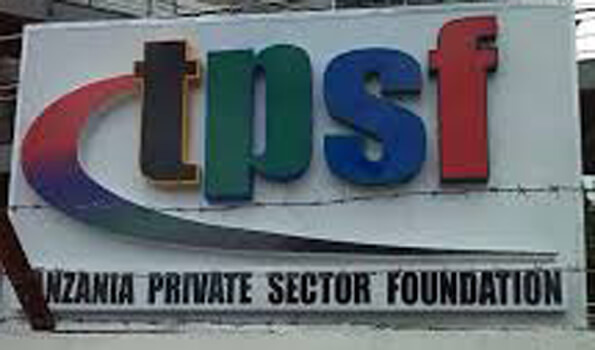
Our Projects are
Transforming African Trade
Quick Contacts
2nd Floor, Fidelity Insurance Centre Waiyaki Way, Westlands

AS the Covid-19 pandemic shatters global trade and the World Bank warns of that sub-Saharan Africa is on the brink of sliding into a first recession in 25 years, the Tanzania Private Sector Foundation (TPSF) and the government remain united to curb the effects of the looming recession.
All along the TPSF has said it stands together with the government in ensuring agricultural and industrial producers do not put working tools aside for that will be catastrophic. Instead, the economically active population must struggle to sustain production while simultaneously fighting against the vexing disease.
The TPSF has held a series of meetings- alone or jointly with the government encouraging its members to promote production in all sectors of the national economy despite hurdles created by the corona epidemic.
In a press statement released on April 21, 2020, the TPSF said: “Tanzania, like any other country, has suffered adversely from the global Covid-19 outbreak.
The TPSF commends the government for effective measures undertaken to combat the spread and impact of Covid-19 in collaboration with the private sector.
In all meetings and on other occasions, the TPSF urges its members to do three things to win the coronavirus war. On March 23, 2020, at a function in Dar es Salaam to salute the Tanzania Horticultural Association (Taha) for striking an innovative cargo deal with the Ethiopian Airlines under which Tanzania’s horticultural exports are flown to Arabian, European and American markets thrice a week, TPSF Chairperson, Angelina Ngalula stressed three elements on the road to victory: “Let me take this opportunity to underscore the tasks above our all other tasks during these trying times: Namely, to give education to the public on the spread, protection and control of this (corona epidemic) harrowing disease.
Two, to ensure vital services, particularly provision of foodstuffs to the public remain uninterrupted. Three, to ensure jobs remain intact,” she said.
Ms Ngalula noted that their foundation supported the government’s position on remaining in offices and on farms. Tanzanians, she appealed, must work very hard to produce food for local and foreign markets and industrial workers must do the same.
“The chairman” she quipped, “believes that sometimes hard times are loaded with opportunities-opportunities that will liberate Taha. For a very long time Taha painfully struggled to export flowers to Europe through Nairobi. We believe firmly that if this new route would be supported it could change transportation environment for the better.”
Lockdowns imposed on both poor and rich countries have, to borrow from the World Bank, “brought economies to a halt and disrupted global trade.” The bank believes sub-Sahara’s GDP will probably shrink between 2.1 and 5.1 per cent this year. The bank says the region’s GDP stands at 2.4 per cent. The bank says the GDP will shrink on account of “large contractions in South Africa, Nigeria and Angola, the three biggest economies.”
Against this backdrop, Ms Ngalula told her audience at a hotel in Dar es Salaam that there was no alternative to hard work. “Tanzanians must now see what is before them. The opportunity has presented itself. Fruits are wanted, vegetables are in great demand. Let us till the land!”
Even at lay level, a growing body of evidence is showing that the pandemic is triggering off transformation. This sudden emerging scenario is likely to create opportunities for nations like Tanzania if they remain united, focused and take bold decisions.
Tanzania has taken bold decisions and must remain watchful. This is not a world of spotless clean angels, but it is a world of human beings. Some humans are envious.
Yes, green with envy. World Bank Vice-President Hafez Ghanen said in a recent statement thus: “The Covd-19 pandemic is testing the limits of societies and economies across the world, and African countries are likely to be hit particularly hard.”
The bank bases the growth downgrade on a sharp decline in output in key trading partners, such as China and the euro area, falling commodity prices, reduced tourism and measures taken to contain the virus.
It estimates the virus outbreak will cost sub-Saharan Africa between $37bn and $79bn as a result of disruptions to trade and value chains, according to a report by Bloomberg. In the April 21 statement mentioned in the foregoing paragraphs, the foundation says: “…
TPSF and Tanzania National Business Council (TNBC) have undertaken a number of initiatives ranging from awareness creation, resources mobilisation, and assessment of risks (adverse impacts) on private sector businesses in Tanzania.
In addition, TPSF has administered an online Poll to collect data and information and compiled results on impact of Covid-19. “In light of the above, TPSF has formed an advisory committee which comprises 14 members.”
According to the statement, the committee will: Advice on actual and potential business risks related to Covid-19 impacts on all clusters of the private sector.
Advise on post-Covid-19 recuperation proposals and build a case to the government, financiers and regional bodies on how to jointly develop recovery projects and programmes. Advise on post-Covid-19 investment strategies in favour of export-oriented manufacturing in Tanzania and Provide policy recommendations to the government on addressing the impacts of Covid-19.
Members are Dr Hoseana Lunogelo, Dr Tausi Kida, Mr Lawrence Mafuru, Mr Phillip Redman, Dr Charles Kimei, Ms Susan Mashibe, Dr Joyce Mapunjo, Mr Michal Bacham, Mr Geoffrey Kirenga, Ms Jennifer Bash, Mr John Ulanga, Mr Edwin Bruno, Mr Seif Said Seif and Mr Aloys Bahebe.
TPSF was established on November 4, 1998 under the Companies Act (Cap 212) as a company limited by guarantee.
It promotes private sector-led social economic development in Tanzania. It is the umbrella body of private sector associations and corporate bodies.
Source: Daily News
Disclaimer: The views and opinions expressed in this article are those of the authors and do not necessarily reflect the official policy or position of TradeMark Africa.